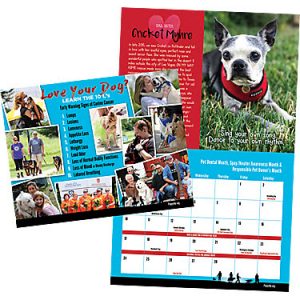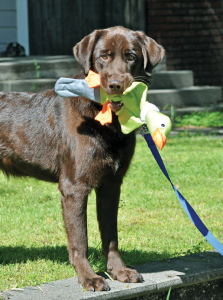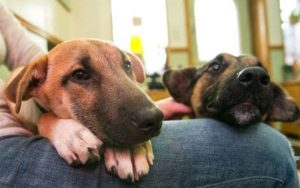
“You may have many best friends but your dog only has one.” — Unknown
In This Issue: 2020 Calendar Contest Winners Announced; (Abstract) “Comparative oncology: what dogs and other species can teach us about humans with cancer”; Mast Cell Tumors; How to Keep Your Dog Safe in an Earthquake; Pup of the Month.
Congratulations To Our 2020 Calendar Contest Winners!

We’re pleased to announce the winners of this year’s Puppy Up Calendar Contest.
Congratulations to the 13 winners and a big thank you to all our contestants, donors, and supporters who have made our 2020 calendar a success!
Below is a list of this year’s winners.
Allison Smith and Thabiso
Khiry Ward and Mamba
Tracy Rishel and Clarence
Eva Mathis and Madam
Ginger Morgan and Hudson
Cynthia Bilbo and Presley
Beth Maurer and Charlie
Diane Farrell and Greta
Michael Golub and Rio
Nicole Bragan and Uri
Janessa Lake and Marley
Elaine Flynt and Tazer
Amy Carpenter and Hank
Stay tuned — we will announce when pre-sales of the calendars will be available.
“Comparative Oncology: What Dogs and Other Species Can Teach Us About Humans With Cancer”
(Abstract from NCBI) “Over 1.66 million humans (approx. 500/100 000 population rate) and over 4.2 million dogs (approx. 5300/100 000 population rate) are diagnosed with cancer annually in the USA. The interdisciplinary field of comparative oncology offers a unique and strong opportunity to learn more about universal cancer risk and development through epidemiology, genetic and genomic investigations.
Working across species, researchers from human and veterinary medicine can combine scientific findings to understand more quickly the origins of cancer and translate these findings to novel therapies to benefit both human and animals. This review begins with the genetic origins of canines and their advantage in cancer research. We next focus on recent findings in comparative oncology related to inherited, or genetic, risk for tumour development. We then detail the somatic, or genomic, changes within tumours and the similarities between species.
The shared cancers between humans and dogs that we discuss include sarcoma (osteosarcoma, soft tissue sarcoma, histiocytic sarcoma, hemangiosarcoma), haematological malignancies (lymphoma, leukaemia), bladder cancer, intracranial neoplasms (meningioma, glioma) and melanoma. Tumour risk in other animal species is also briefly discussed. As the field of genomics advances, we predict that comparative oncology will continue to benefit both humans and the animals that live among us.”
For the complete article, please follow this link.
Mast Cell Tumors

Labradors are prone to a particularly aggressive type of mast cell tumors. Pugs, Boxers, Golden Retrievers, Beagles, and Boston Terriers are also overrepresented in the population of dogs with MCTs.
It’s particularly challenging to predict the prognosis for this type of canine cancer – sometimes it’s harmless; sometimes it’s deadly.
(From the Whole Dog Journal)
By Barbara Dobbins
Mast cell tumors (MCTs) are the most common form of malignant skin cancer that occurs in dogs, accounting for about 14 to 21 percent of all skin tumors. There is significant variability in the presentation of MCTs from dog to dog and even from tumor to tumor, which explains why this form of canine neoplasia is often referred to as complicated and challenging. But the fact remains that MCTs are treatable, and many dogs are considered cured after treatment and go on with happy, healthy lives.
How MCTs Develop
Mast cells are a subtype of white blood cells that derive from the bone marrow and then become residents of specific tissues, especially those that are closest to the external surfaces of the body, such as the tissues of the nose, mouth, lungs, skin, and around blood vessels. Their primary functions include defense against parasitic infection, tissue repair, and formation of new blood vessels; they also play an important role in the allergic response system. They can be activated by the immune system – a process called degranulation – to release a wide variety of inflammatory mediators, including histamine and heparin, which in turn modify immune reactions and inflammation.
When mast cells replicate in higher than normal numbers, an MCT (also known as a mastocytoma) can form. They are usually first noticed on or just under the skin, but they can form anywhere on the body. The most common location is on the trunk, followed by the limbs and in between the toes; they can occasionally be found on the head and neck. The skin mass might appear as a raised lump or bump or growth; it can soft or firm; hairless or covered by hair; it may or may not be red, ulcerated, or swollen.
MCTs can also occur internally, developing on the spleen, liver, intestine, and in bone marrow, as well as on the salivary gland, nasopharynx, larynx, oral cavity, gastrointestinal tract, ureter, and spine. This type is more aggressive, and it is usually preceded by dermal and subdermal tumors.
Read more here.
How To Keep Your Dog Safe In An Earthquake

With the number of earthquakes recently, we thought we’d include this article on keeping your dog safe during and after a quake.
From Dog Tripper
By Paris Permenter & John Bigley
Living in Texas, we take steps to make sure our pets are safe in the event of natural disasters like flash floods, wildfires, tornadoes and hurricanes. But we rarely think of how to keep your dog safe in an earthquake–even though a large number of small earthquakes have occurred in our state. We’ve only been in one earthquake in all our travels (and our dogs weren’t with us) but this week’s strong California quakes have made us ask ourselves: what if we were traveling with our dogs when an earthquake hit–or what if a large earthquake should hit close to home?
We just received some tips from American Humane, the country’s first national humane organization, and its American Humane Rescue team. Here are some important tips from American Humane President and CEO Robin Ganzert, PhD, to keep pets safe before, during, and after an earthquake and its aftershocks:
Have a pet disaster preparedness kit ready.
Earthquakes and aftershocks often strike without warning so prepare a kit with a waterproof bag, leash, blanket, first-aid supplies, medications and medical records in a waterproof container, food and water bowls, and 7-10 days of food. Pet owners should also have their pet’s crate or carrier at the ready.
Know where you’ll go in an emergency.
Choose a safe place where you and your pets can go in a disaster. Contact your veterinarian for a list of facilities, find a safe, pet-friendly hotel, or ask your local shelter if they provide emergency shelter for pets.
Never leave your pets behind.
If you have to leave them behind, do not tether, crate or restrain your animals, giving them a chance to escape a dangerous situation, if necessary.
Make sure your animals have identification.
Your pet’s tag should include their name, your telephone number, and vital health information. American Humane recommends microchipping your pet to increase the chance of being reunited. Keep a photo in case you’re separated and need to identify your pet if it is rescued to a shelter.
After a disaster, keep a close watch on pets.
Keep pets away from power lines, debris, and contaminated ground water from broken water mains and sewers. Give pets time to re-orient themselves. Familiar scents and landmarks may be altered, confusing your pet, who may get lost. Uncertainty affects animals, too. Your pet may become more aggressive or self-protective. Keep more room between them, other animals, children or strangers. Comfort your pet with lots of pats or hugs, and provide a quiet environment, even if it is not their own home.
Read the rest of the article here.
Pup of the Month — Rocky Rowley

(By Norma Rowley) My dear Rocky lost his battle with liver cancer on February 10, 2016. He was an awesome companion and frequent visitor to a local nursing home as well as other local venues. He was an Australian Terrier, a breed that is not that common in the Eastern U.S., and he was a wonderful ambassador for his fellow Aussies. Rocky was lovingly and compassionately treated by Dr. Christie Schroth at Point Breeze Veterinary Clinic, and he passed away peacefully beside me at home. My heart was broken, and I still miss him every day. I am a two-time breast cancer survivor myself, so the crusade for improved cancer treatments AND a cancer cure for humans as well as for our animals is very personal for me.
(Rocky was a contestant in this year’s 2020 calendar contest.)
|
How You Can Help Just like there are many different breeds of dogs, The Puppy Up Foundation, needs many different volunteers to help the organization. No matter where you live or how much time you have to offer, there is a role for you. Are you detailed-oriented, creative and artistic, great at internet research or making phone calls? Would you like to volunteer at fun, educational events? Share your interests and talents and help raise awareness and funding for canine cancer and comparative oncology. Donate to the Cause It’s estimated that between 4 and 6 million dogs die from cancer each year and recently it was announced that 36 children a day are diagnosed with cancer. Our pets and our children are being attacked by this deadly disease. Your donation to The Puppy Up Foundation will help further our mission of discovering the causes of cancers and their common link in both pets and people. Your gift is very much appreciated and fully deductible as a charitable contribution. The Puppy Up Foundation is a 501 C(3) organization and our tax ID number is 47-2319212. All transactions conducted on our Web site are encrypted using a secure server to protect your privacy. All donations are final. All transactions are happening in the United States. We’d love to see you and your pups at one of our PuppyUp Walks. Our PuppyUp Walks really are a lot of fun, and a great way to meet new people and share experiences, ideas, stories, and information. Many of the people we meet through the walks become life-long friends. If there isn’t a Walk in your area, please follow this link and learn how you can make one happen. And check back often to our upcoming walks, as we are booking walks around the country throughout the year. Puppy Up! Kroger Community Rewards Program Helping The Puppy Up Foundation Every time you shop at Kroger and use your Rewards Plus Card you can help us earn money. All you have to do is log in to your Kroger account and click on Community Awards. Search for The Puppy Up Foundation either by name or IQ193 and click enroll. Don’t forget to use your card each time you shop at any Kroger. Thank you for your support! |
|
Our Mission
The Puppy Up Foundation’s mission is to bring awareness to canine cancer, its similarities to human cancer, and to fund education, awareness, and research that benefit both pets and people. For more on the grants your generous donations continue to fund, please follow this link.
Disclaimer
The Puppy Up Foundation does not endorse nor recommend any particular product, service, or treatment. We offer information strictly for educational and/or informational purposes. We believe it is the pet owner’s responsibility to do the research and draw his or her own conclusions.
We can always use your help. If you’re interested, send me an mail at ginger@puppyup.org. Sincerely, |








